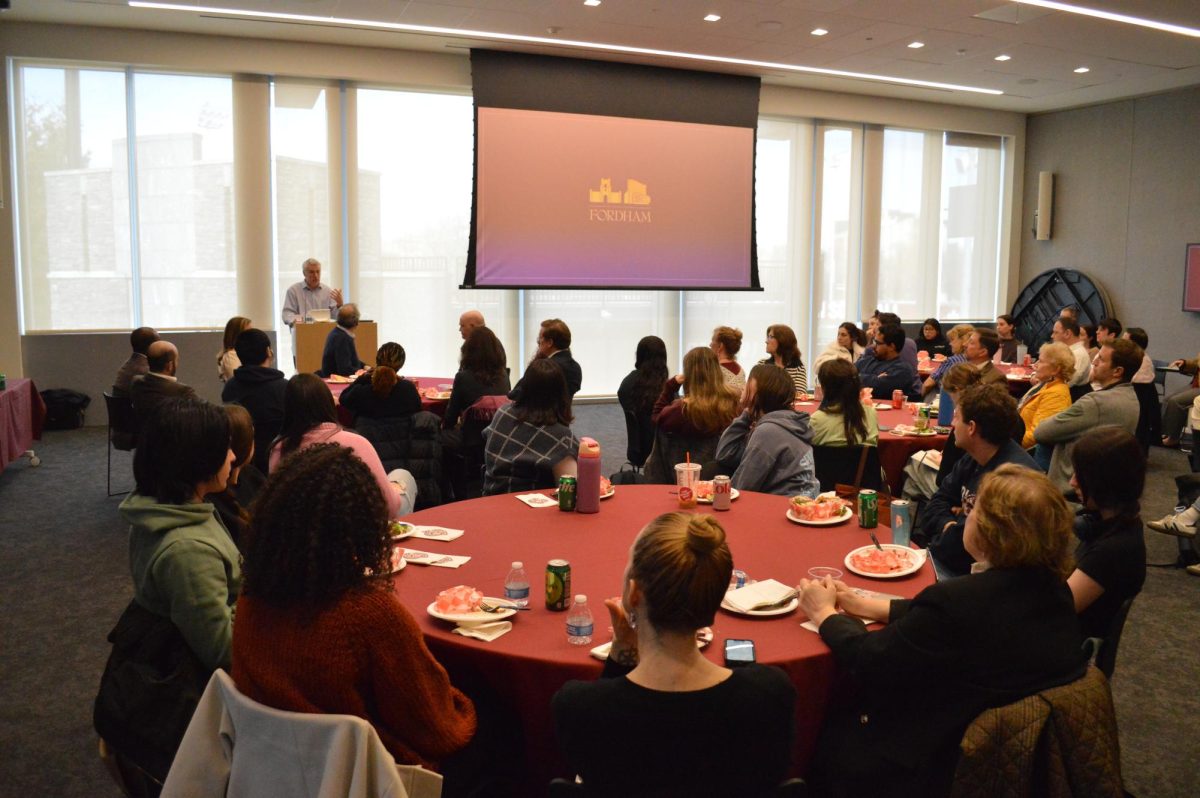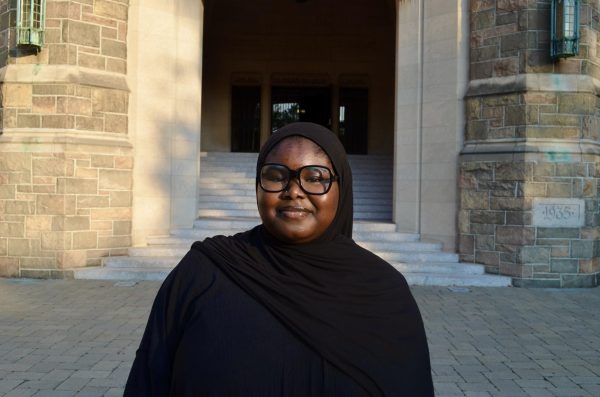The FitzSimons Presidential Initiative on Civics and Civility hosted its first presentation for its Lunch and Learn speaker series on Wednesday, March 12. Anthony Berry, the civics and civility fellow in the Office of the President, announced the mission of the new speaker series in an email on March 7.
“We are witnessing significant shifts in the separation of powers and new pressures on the levers of democracy,” he said in the university-wide email. “This is a critical moment to deepen our understanding of the American system of government and the institutional values at stake.”
Michael Baur, associate professor of philosophy and adjunct professor of law at Fordham University, gave the first presentation, “The Rule of Law: What is it and Why Does it Matter?”
The rule of law is a social and political principle that orders our society. Baur highlighted that the rule of law includes the three Cs: the common good, consensus and constraint (or non-arbitrariness).
“The important thing to keep in mind when we talk about the rule of law is that the rule of law means government that is not arbitrary or partial or capricious or willful,” said Baur. “Government that is non-partial is government for the sake of the common good.”
When something is non-arbitrary, it is based on logic or reason instead of personal whims or favoritism. Baur differentiated between the rule of law and the rule of men, a personal-style of rule that lacks a legal system, to underscore the importance of a non-arbitrary government. He felt it was important to give this presentation now because of what he views as the recent disintegration of the rule of law.
“We are beginning to see the signs in our country of the breakdown of the rule of law,” said Baur. “I wanted to not only explain what the rule of law is but how we should make sense of the breakdown of the rule of law and what, if anything, can we do about it.”
Baur says that because agencies that protect national parks, foreign aid, government-funded media outlets and education are being defunded and dismantled, the importance of working for the common good and avoiding acting on personal whims is becoming evident.
“The Department of Education is in the midst of disassembling itself, and it’s questionable whether the ways of disassembling these administrative agencies is even legal, so the question about whether the rule of law still exists is a living question that didn’t exist before,” said Baur.
However, Baur underscores the fact that we have the ability to cultivate civility. He suggested that we can work to counteract this loss of confidence in the rule of law by having conversations, especially with those we disagree with.
“On the level of the national conversation, anyways, it’s really hard to see if there is a common good,” said Baur. “But my hope and my expectation is if people talk to one another more locally, they’ll see the common goods they do share that make possible the better narrative than the one we have now.”
Kim Watkins, a master’s student at the Fordham Graduate School of Education, attended the event and resonated with Baur’s idea of cultivating civility.
“My passion is getting people involved in local civic responsibility and engagement,” said Watkins. “I actually think we should be really focusing on how students understand the specific issues that affect them on the day-to-day basis.”
Watkins is the director of curriculum at Cristo Rey High School in Harlem. She says she can see herself incorporating this key takeaway about civic responsibility into her work with students there.
“The idea of any disagreement having the basis of an underlying agreement beneath it is huge, and it applies to every aspect of the teaching that I do at Cristo Rey and even what I am learning about in terms of the master’s program,” said Watkins.
Her school is part of the network of 40 Cristo Rey Jesuit high schools in the United States. The school operates as a work-study program, primarily located in areas with disadvantaged students. As her students get a glimpse into the professional world, they can also learn the importance of civil responsibility and practice respectful disagreement.
Alexa Davidson, FCRH ’25, also attended the event. She feels that events like this are important because they show that people are interested in and willing to learn about current events. She also acknowledges that these conversations are more difficult to have than one might expect.
“I agree with Professor Baur that it is very important to have conversations with people you disagree with and to actively listen to what others are saying in order to better understand where they are coming from and why they believe what they do,” said Davidson. “When confronted with a difficult conversation, I try to employ Professor Baur’s advice of finding common ground. However, that is easier said than done.”
Baur argues that we must start small or locally. If we can find good in the people around us, especially those we disagree with, we can start to see a broader common good and consensus. This presentation highlighted that individual civic action strengthens the rule of law.
“Because civics and civility is the very medium through which we can express our shared humanity, we can’t possibly talk to one another about our common humanity, our common vulnerabilities, and our common problems if we can’t have a framework, and it’s often a legal framework, for solving and addressing those shared concerns,” said Baur.
Consensus might feel like a far-off fantasy in an increasingly divided political climate. However, Baur clarifies that consensus is not necessarily about total agreement on issues. Instead, it is about creating a foundation of respect for others and the common good, allowing for healthy debate and disagreement.
The FitzSimons Initiative will continue to host Lunch and Learn speaker events throughout the semester. On Monday, March 24, Melissa Labonte, Ph.D., presented about foreign aid. The next presentation will be on April 4 at Lincoln Center.
“I hope that students and all those who attend can feel more informed about each given topic and feel compelled to get more involved civically in some way,” said Berry. “That could be through learning more on their own about one of the topics, deciding to call their local or federal representatives’ offices to make their voice heard, or simply finding the opportunity to talk about what’s going on with their friends and family.”
Information about the initiative and its events can be found on Fordham’s Office of the President webpage.









































































































































































































